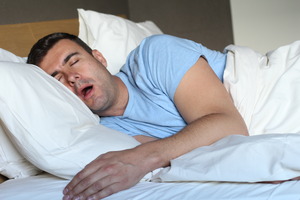
Drooling in your sleep may seem like an embarrassing problem, but it’s actually quite common. In fact, it’s often considered normal. However, if you’re drooling excessively in bed, it could be a sign of a larger health issue – such as obstructive sleep apnea. Here’s why sleep drooling may actually be a sign of sleep-disordered breathing.
How Can Sleep Apnea and Drooling Be Connected?
Sleep apnea is characterized by repeated pauses in your breathing, which is often due to your airway becoming blocked. There are several risk factors associated with sleep apnea, including breathing through your mouth. This is significant because mouth breathing can lead to increased drooling as a consequence of the mouth being open. In other words, drooling more than normal while asleep could be a sign that you’re suffering from sleep apnea.
What Other Symptoms Can Point to Sleep Apnea?
Sleep apnea tends to result in loud snoring, gasping, or choking. Patients who suffer from it are more likely to wake up during the night or experience headaches in the morning. They may also feel unusually tired and have trouble focusing.
If your bedtime drooling is accompanied by any of the symptoms listed above, there’s a good chance that sleep apnea is to blame. Of course, merely observing symptoms isn’t enough for a proper diagnosis. You will need to have a sleep test performed if you want to determine the true nature of your sleep problem.
What Can You Do About Sleep Apnea and Drooling in Your Sleep?
There are a number of strategies you can try to manage your sleep apnea as well as reduce sleep drooling. However, there is at least one treatment option that can potentially address both problems: wearing an oral appliance. This device can slightly reposition your lower jaw and keep your tongue in place, which reduces the chances of your breathing being interrupted. On top of that, ensuring that your jaw and tongue are in the right positions can sometimes help you drool less.
It should be noted that when you first get your oral appliance, your mouth may produce more saliva than normal, which is its natural response to a foreign object. Over time, though, your body will get used to the presence of the oral appliance, so the problem of increased saliva production will effectively take care of itself.
Drooling in your sleep is something that you may be reluctant to admit to, but if there’s any reason to suspect that it might be connected to sleep apnea, you can’t afford to ignore it. Reach out to a sleep expert today if you have concerns about the quality of your slumber.
About the Practice
At Oak Ridge Dental, we offer many different services for protecting and improving our patients’ smiles. We even provide oral appliances for those who want to treat their sleep apnea without a CPAP machine. If you would like to schedule an appointment at Oak Ridge Dental in San Ramon, visit our website or call (925) 735-6190.




